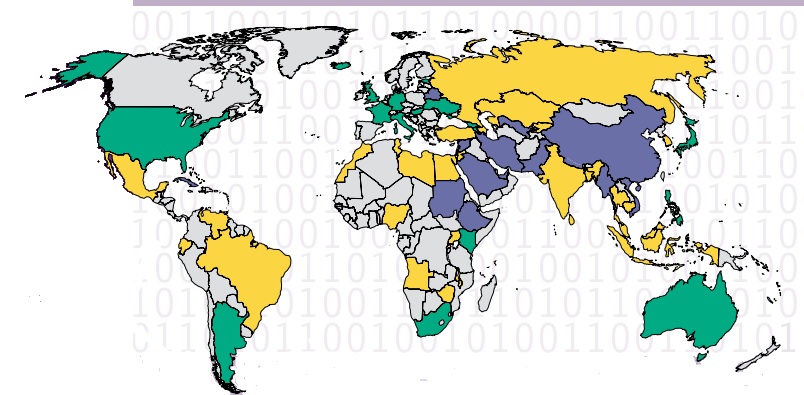Freedom on the internet: Hungary ranks no. 8 in study

Independent watchdog organization Freedom House released its fourth annual “Freedom on the Net” report last week; in its ranking of 60 countries examined in terms of internet freedom, Hungary placed eighth to earn the country the “free” label, despite slipping some four points to a score of 23, where 0 is the ideal score. Iceland and Estonia were ranked in the top two places.
In announcing the release of “Freedom on the Net 2013,” Freedom House noted a worldwide decline in internet freedom, “thanks” to various incidents of “broad surveillance, new laws controlling web content, and growing arrests of social-media users.”
Hungary’s own drop in score and increase in what Freedom House deemed “Violations of User Rights” was in line with the majority of the 60 nations studied as a whole: Some 35 nations assessed in the survey had broadened their technical or legal surveillance powers over the past year, and all but one received a worse score from Freedom House.
“While blocking and filtering remain the preferred methods of censorship in many countries, governments are increasingly looking at who is saying what online, and finding ways to punish them,” said Freedom on the Net project director Sanja Kelly. “In some countries, a user can get arrested for simply posting on Facebook or for ‘liking’ a friend’s comment that is critical of the authorities.”
And in Hungary…? A few excerpts from the report are as follows.
● For key points in understanding Hungarian internet freedom, Freedom House noted “Revisions to the criminal code, passed on June 25, 2012[,] could allow the government to block websites if host providers fail to respond to takedown notices”; “the Supreme Court fined two blog owners for defamation based on readers' comments, even though the comments were deleted” and “The fourth modification of the constitution annulled previous decisions of the Constitutional Court, causing uncertainty as to how previous legal protections, particularly regarding free speech, will be interpreted.”
● “The National Core Curriculum for 2013 drastically decreased the number of IT classes in primary and high schools, possibly maintaining and further increasing the digital divide between social groups, as children coming from poor families may not have access to computers and other digital devices in their homes.”
● “In June 2012, the Supreme Court fined two blog owners who were found guilty of defamation for comments that were posted by users on their websites, even though the comments were subsequently deleted. Additionally, cyberattacks against government websites continued to take place, and there was one case of physical assault against an online journalist covering a rally in October 2012.”
● “The Fundamental Law of Hungary acknowledges the right to freedom of expression and defends ‘freedom and diversity of the press,’ though there are no laws that specifically protect online modes of expression.”
● “A series of interviews conducted with journalists in 2012 provide a picture of the extent of self-censorship in Hungary, which is due to political and economic pressure on both traditional and online media outlets. According to most of the interviewees, the media laws had not made any difference when it came to self-censorship; instead, as one respondent noted, ‘the two-thirds majority push of executive power, the unprecedented leverage of that power, and the rise of the Fidesz party’ have had a greater effect on self-censorship. Another journalist added that ‘party finance is entangled with media financing. Political and economic influence is exerted through public and private advertising.’ A respondent explained that ‘there was always some other interest at play, political or from the side of business and advertising—or both simultaneously, because these two often go hand in hand.’”
● “…in September 2011, photographers of the online news portals Index.hu and Origo.hu were banned from parliament because they had allegedly taken pictures of the prime minister’s notes. In a separate incident in December 2011, journalists from Index.hu were banned from parliament for being disrespectful after they posted a video of two reporters singing and dancing in the building. [Offending video embedded below.] The journalists were permitted to enter parliament again roughly one month later. In January 2012, a photographer from Vagy.hu was not admitted to the public ball of Debrecen city because the organizers claimed that the local news site was not registered with the NMHH. In October 2012, there was one physical attack against a journalist of Index.hu, whose nose was broken by an extreme-right protester at an anti-government rally. … These types of incidents impede the ability of journalists to cover the news, compromising the Hungarian news and information landscape.”
The massive, 888-page report is available for free download here.
SUPPORT THE BUDAPEST BUSINESS JOURNAL
Producing journalism that is worthy of the name is a costly business. For 27 years, the publishers, editors and reporters of the Budapest Business Journal have striven to bring you business news that works, information that you can trust, that is factual, accurate and presented without fear or favor.
Newspaper organizations across the globe have struggled to find a business model that allows them to continue to excel, without compromising their ability to perform. Most recently, some have experimented with the idea of involving their most important stakeholders, their readers.
We would like to offer that same opportunity to our readers. We would like to invite you to help us deliver the quality business journalism you require. Hit our Support the BBJ button and you can choose the how much and how often you send us your contributions.








